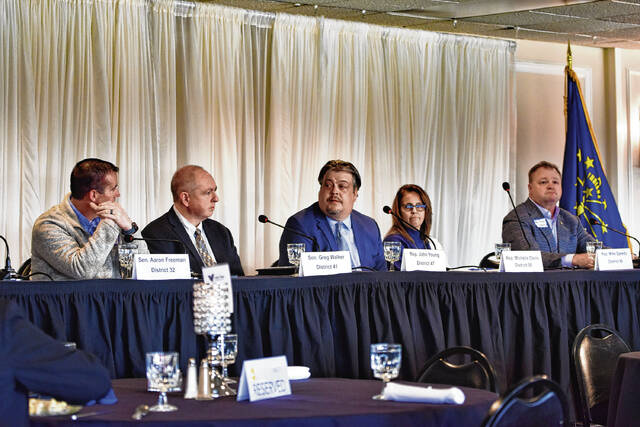Local lawmakers capped off their first week of this year’s session by discussing COVID-19 vaccine mandates, labor issues and marijuana legalization during a chamber luncheon Friday.
State Reps. Michelle Davis, Mike Speedy and John Young, and State Sens. Aaron Freeman and Greg Walker were the featured panelists during Aspire Johnson County’s first Legislation Matters event of the year at Valle Vista Golf Club, Wedding Venue and Conference Center in Greenwood. Officials discussed the 2022 session of the Indiana General Assembly in a Q-and-A format.
The tone of the session has been good so far, lawmakers say. In both the House and Senate, legislators have tried to conduct debates in high-level ways, regardless of party, Sen. Aaron Freeman, R-Indianapolis, and State Rep. John Young, R-Franklin, told the crowd.
“I don’t see this as being a more highly contentious session,” Young said.
Indiana State Rep. Michelle Davis listens as Rep. John Young, left, speaks during Aspire Johnson County’s Legislation Matters event Friday at Valle Vista Golf Club, Wedding Venue Conference Center in Greenwood.
NOAH CRENSHAW | DAILY JOURNAL
Indiana State Rep. Mike Speedy, R-Indianapolis, speaks during Aspire Johnson County’s Legislation Matters event Friday at Valle Vista Golf Club, Wedding Venue Conference Center in Greenwood.
NOAH CRENSHAW | DAILY JOURNAL
Indiana State Sen. Aaron Freeman, speaks as Sen. Greg Walke listens during Aspire Johnson County’s Legislation Matters event Friday at Valle Vista Golf Club, Wedding Venue Conference Center in Greenwood.
NOAH CRENSHAW | DAILY JOURNAL
Indiana State Sen. Greg Walker, R-Columbus, speaks as State Rep. John Young, R-Franklin, listen in the background during Aspire Johnson County’s Legislation Matters event Friday at Valle Vista Golf Club, Wedding Venue Conference Center in Greenwood.
NOAH CRENSHAW | DAILY JOURNAL
Indiana State Rep. Michelle Davis, R-Whiteland, speaks as Rep. Mike Speedy, R-Indianapolis, listens during Aspire Johnson County’s Legislation Matters event Friday at Valle Vista Golf Club, Wedding Venue Conference Center in Greenwood.
NOAH CRENSHAW | DAILY JOURNAL
Indiana legislators Aaron Freeman, Greg Walker, John Young, Michelle Davis and Mike Speedy listen to a question from moderator Eric Prime during Aspire Johnson County’s Legislation Matters event Friday at Valle Vista Golf Club, Wedding Venue Conference Center in Greenwood.
NOAH CRENSHAW | DAILY JOURNAL
One of the first bills discussed was House Bill 1001, a bill which would not only end Gov.
Eric Holcomb’s COVID-19 public health emergency, but also authorize several administrative actions that would allow Indiana to continue to receive federal emergency funding and take aim at vaccine mandates.
The bill would prevent employers from imposing a COVID-19 vaccination requirement unless they provide employees an option to opt out of the requirement and offer COVID-19 testing. It would also forbid employees from taking adverse action against employees who have requested or used an exemption, according to the latest bill draft.
Business leaders, including Aspire, have voiced concerns about who would foot the bill for testing, and the government’s involvement with private businesses and restricting their ability to make mandates in general. Lawmakers are aware of the concerns and are having discussions about how to address them. Legislators are working on a way for the state to help fund the testing costs, Young said.
“(House Bill) 1001 is not a prohibition on mandates. An employer can mandate vaccines, but if they do, (the bill) gives the employee lots of different rights … and offers options (other than) a mandate, ” said State Rep. Mike Speedy, R-Indianapolis.
Lawmakers have also heard from businesses about the Occupational Safety and Health Administration’s vaccine mandate. The mandate, which is codified through an emergency temporary standard issued Dec. 17, would require employers who have more than 100 employees to “develop, implement and enforce” a mandatory vaccine policy or require employees to undergo regular COVID-19 testing, according to the standard. The OSHA mandate was stayed last month, pending a decision from the U.S. Supreme Court on its legality Friday — something State Sen. Greg Walker, R-Columbus, supports.
“I do not support the federal government’s position of using OSHA regulation to circumvent what should be the responsibility either of an executive order, or of Congress,” Walker said.
People should also be aware the House bill may not be a ticket for people to avoid being fired because they do not want a vaccine, he said.
The topic shifted to COVID-19 vaccines when lawmakers were asked about their thoughts on Indiana’s lag in vaccinations against COVID-19, and how it could be addressed. Nearly 53% of the state’s population is fully vaccinated against COVID-19, and the state has one of the lowest vaccination rates out of 50 states plus Washington, D.C., according to the Mayo Clinic.
Freeman, who is vaccinated and has had a booster shot, criticized national figures for saying people shouldn’t take the vaccine because the other side, or party, created it. It’s irresponsible for people to say things like that, he said.
“We all have to be better in our public life. We should demand better from our elected officials,” Freeman said.
State Rep. Michelle Davis, R-Whiteland, told the audience she feels the opposite of Freeman. Davis is not vaccinated, nor is her family, she said.
“I think it’s a choice, once again, and I don’t know if we want the General Assembly making those decisions to take away the choices from Hoosiers,” Davis said.
The government’s role is to provide the best information possible about the vaccines so Hoosiers can make the decision for themselves. It’s an individual choice which could have consequences, but it’s a choice people can weigh themselves, Young said.
Walker told business leaders he spent a morning-and-a-half at Columbus Regional Hospital’s emergency room, and another three days in the hospital’s ICU with his wife last month to watch what was happening there. Knowing there is a way to reduce the workload of the health care system, people could help hospitals provide more opportunities and resources for those who may have even more life-threatening conditions than COVID-19, he said.
“It is a community responsibility if we’re going to live together and be at peace with one another to at least give consideration for, ‘Maybe it’s not a threat to my life, but it might be a threat to my wife’s life,’” Walker said. “We need to put a little compassion to our education and speak candidly about the things that are important in life.”
Legislators also discussed ways to address labor issues and workforce availability. Many businesses and entities across the county are struggling to hire and retain workers.
There are few ways to deal with the issue. The options are to increase the pool of workers or decrease the number of jobs. Looking at the big picture, lawmakers have identified that Indiana’s population is not growing at a rate that allows for economic expansion. There is also a need to look at how short-term solutions compare to long-term solutions, Walker said.
Marijuana legalization was another topic of discussion.
So far this session, at least four bills were filed about legalizing or decriminalizing some form of marijuana in Indiana. Legalization is one of the Senate Democratic Minority’s priorities this session.
Marijuana is classified as an illegal federal narcotic drug, and the state shouldn’t make it legal until the federal government legalizes it. Until then, states should follow the law, regardless of whether its residents like it, said State Sen. Aaron Freeman, R-Indianapolis.
“When you allow government to start selectively enforcing which laws they’re enforcing and not, we got real issues,” Freeman said. “From where I sit, I’m happy to vote on the issue once our federal government friends figure this out.”
Lawmakers have had discussions in the past about decriminalizing possession of small amounts and making it an infraction, and should continue to do so, Young said.
“I am not very keen on passing a law that is otherwise illegal federally,” he said. “Somebody that has a small amount, should that be a criminal offense? I think that’s a good discussion to have.”











